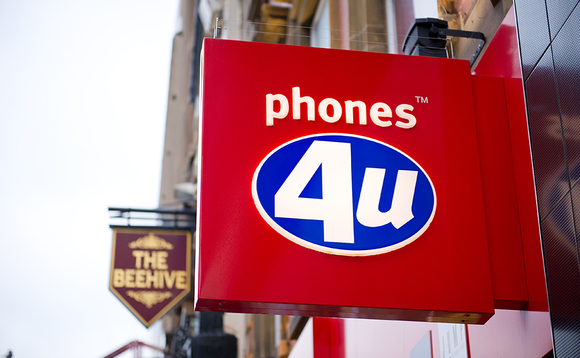
Deal in focus: Delving into the Phones4u collapse

The fallout from BC-backed Phones4u’s failure to agree an extension to partnerships with EE and Vodafone has laid bare the hallmarks of a bitter divorce. Kenny Wastell reports
This month, BC-backed UK mobile phone retailer Phones4u entered into administration following decisions by mobile networks EE and Vodafone not to renew their partnership agreements with the company. The development led to the immediate closure of Phones4u's 700 outlets while PwC, acting as administrator, sought out potential buyers. The jobs of more than 5,500 employees hung in the balance.
The inevitable blame game ensued, with both BC and Vodafone issuing statements distancing themselves from responsibility for the very public separation. Vodafone stated it had been actively looking to extend the contract with Phones4u, though it said it had been unable to agree to the terms on offer. A spokesperson for the mobile network cited a lack of flexibility in negotiations, blaming Phones4u's "debt repayment obligations" for the ultimate breakdown in talks.
After acquiring the company in a secondary buyout in 2011 reportedly worth in the region of £600-700m, Phones4u refinanced by issuing bonds worth £200m on the Irish Stock Exchange in September last year. All proceeds from the refinancing were earmarked for paying BC a one-off dividend, with the Financial Times reporting the GP made a 30% profit on its overall equity investment as a result.
EEny, mEEny, money, no
Responding to Vodafone's statement, BC expressed its shock at the decisions of both Vodafone and EE to sever ties. The GP's managing partner, Stefano Quadrio Curzio, said Vodafone's decision appeared "to have been designed to inflict the maximum damage," adding it gave Phones4u "no time to develop commercial alternatives". He also described EE's decision not to renew its partnership as "surprising in the context of a contract that has more than a year to run".
A source close to BC told unquote" the collapse of the negotiations with Vodafone had nothing to do with the capital structure of Phones4u. Instead, they cited Vodafone Group's £19bn Project Spring; originally described as an organic growth strategy, but one for which the group set aside £100m earlier this year for strategic acquisitions in the UK. The source confirmed Vodafone UK presented a document to Vodafone Group entitled Phones4u – partner of choice – as seen in a photograph shared by Sky News reporter Mark Kleinman via Twitter. It is understood Vodafone, alongside EE, was also interested in acquiring Phones4u, or a number of its outlets, to continue its move towards direct sales channels.
Responding in a written statement to suggestions EE and Vodafone may have stalled on signing extensions while weighing up a potential acquisition, a Vodafone UK spokesperson told unquote": "In late autumn 2013, the management team of Phones4u approached Vodafone UK to propose that EE and Vodafone UK should jointly invest in – and then potentially acquire – the Phones4u business. For regulatory and commercial reasons the acquisition of Phones4u was not an option. The Vodafone UK management team took legal advice again in the early summer to review the subject but it was quickly dismissed given the advice remained the same."
Dividing up the estate
For its part, PwC has been able to safeguard more than 2,000 jobs by selling a number of stores and transferring in-store concessions – situated in branches of electronics retailer Currys – to Phones4u's main competitor Dixons Carphone. More gallingly for BC, 58 of the stores sold through the process went to EE, while 140 were taken over by Vodafone.
Regardless of which party is ultimately responsible, BC is open to criticism for its failure to sufficiently diversify Phones4u's product offering and respond to changing trends within the mobile retail industry. While the company did indeed look to diversify through its concessions in Dixons, it retained a business model reliant on a handful of mobile operators; namely Three, Vodafone, O2 and EE. This left the company increasingly vulnerable as, one-by-one, its partners shifted their focus towards direct sales channels.
A source close to the situation argues that, while this risk was present from the beginning, the negative effect widely speculated about showed no signs of becoming a real threat. It is understood networks targeting higher-spending customers grew to depend on high-street brands such as Phones4u and its main competitor Dixons Carphone to attract a different demographic. Furthermore, BC first invested in Phones4u at a time when the smartphone and tablet computer markets were on the verge of experiencing a huge boom. The company, it is argued, had demonstrated impressive growth since.
It is also argued Dixons Carphone – and the mobile retail industry as a whole – remains highly dependent on this type of partnership, even following the loss of its main competitor and the diversification brought about through its merger. Before joining forces with Dixons, Carphone Warehouse had actively been increasing its emphasis on the sale of mobile phone accessories as well as devices themselves. However, its merger with Dixons is aimed at pushing that diversification further still. The company is looking to capitalise on the emerging "internet of things" trend, whereby mobiles are able to remotely control everyday consumer items including fridges, washing machines or central heating systems.
In Phones4u's defence, it is understood the company may itself have been a potential target for Dixons, prior to the Dixons Carphone merger. Had the deal been concluded, its fate would likely have been very different. It is certainly true circumstances conspired against Phones4u. However, it appears high levels of leverage and the inability to sufficiently respond to a changing retail landscape also played important parts.
Latest News
Stonehage Fleming raises USD 130m for largest fund to date, eyes 2024 programme
Multi-family office has seen strong appetite, with investor base growing since 2016 to more than 90 family offices, Meiping Yap told Unquote
Permira to take Ergomed private for GBP 703m
Sponsor deploys Permira VIII to ride new wave of take-privates; Blackstone commits GBP 200m in financing for UK-based CRO
Partners Group to release IMs for Civica sale in mid-September
Sponsor acquired the public software group in July 2017 via the same-year vintage Partners Group Global Value 2017
Change of mind: Sponsors take to de-listing their own assets
EQT and Cinven seen as bellweather for funds to reassess options for listed assets trading underwater








